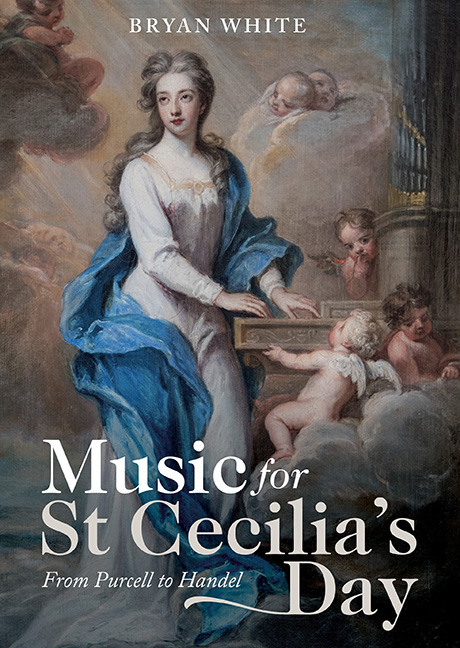Book contents
- Frontmatter
- Dedication
- Contents
- List of Plates, Tables and Music Examples
- Preface and Acknowledgements
- Note to the Reader
- Abbreviations
- Introduction
- 1 The Rise and Fall of the London Cecilian Feasts 1683–1700
- 2 ‘A splendid entertainment’: The Musical Society and the Organization of the Cecilian Feast
- 3 The London Odes 1683–1700
- 4 ‘Church-Musick Vindicated’: Services for St Cecilia's Day
- 5 Provincial Celebrations of St Cecilia's Day
- 6 Cecilian Music in London after 1700
- Bibliography
- Index
- Miscellaneous Endmatter
- Frontmatter
- Dedication
- Contents
- List of Plates, Tables and Music Examples
- Preface and Acknowledgements
- Note to the Reader
- Abbreviations
- Introduction
- 1 The Rise and Fall of the London Cecilian Feasts 1683–1700
- 2 ‘A splendid entertainment’: The Musical Society and the Organization of the Cecilian Feast
- 3 The London Odes 1683–1700
- 4 ‘Church-Musick Vindicated’: Services for St Cecilia's Day
- 5 Provincial Celebrations of St Cecilia's Day
- 6 Cecilian Music in London after 1700
- Bibliography
- Index
- Miscellaneous Endmatter
Summary
THIS book explores music written and performed for St Cecilia's Day (22 November), or on the theme of St Cecilia, in Britain between 1683 and 1739. The period begins with the first recorded celebration of St Cecilia's Day, for which Henry Purcell's ode ‘Welcome to all the pleasures’ was written, and closes with Handel's second Cecilian ode, a setting of Dryden's A Song for St Cecilia's Day, 1687. Encompassed within these boundaries are Dryden's aforementioned Song and Alexander's Feast, Henry Purcell's ode ‘Hail, bright Cecilia’ and Handel's settings of Dryden's odes, works that have come to be among the best known and most highly valued contributions to the Cecilian tradition in Europe. It is perhaps ironic they should have been written in a Protestant country in a period in which Catholicism was seen as a clear and present danger to the national polity. This book seeks to engage with this problem by examining the circumstances that led to a flourishing of tributes to Cecilia in this period. The characteristic form of tribute to Cecilia in Britain was the musical ode. It was distinct to Britain, and its secular emphasis suited a context in which Cecilia was figured as a secular saint. When sacred music was introduced into British celebrations of St Cecilia's Day, the saint was side-lined; she is never mentioned in sermons preached on her feast day, or in the texts sung in religious services held on the same.
In order to better understand the unique approach to celebrations of St Cecilia in Britain, it is helpful to explore briefly the history of her legend and the way in which she came to be associated with music and musicians. St Cecilia first enters the written record in the Passio Sanctae Caeciliae probably composed at some time in the late fifth century. This is a fictitious account of a beautiful Roman noble woman who, having committed herself to life as a virgin in the service of Christ, is betrothed by her father against her will to a young aristocrat named Valerian. On the wedding night she informs Valerian of her intention to remain a virgin, and of the Angel of God that protects her. Inspired by her ardour, Valerian seeks out Pope Urban and converts to Christianity.
- Type
- Chapter
- Information
- Publisher: Boydell & BrewerPrint publication year: 2019

